Grnčari
Грнчари Gërçar Grınçar | |
|---|---|
Village | |
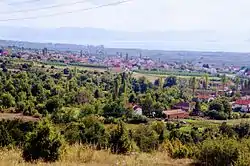 Panoramic view of the village | |
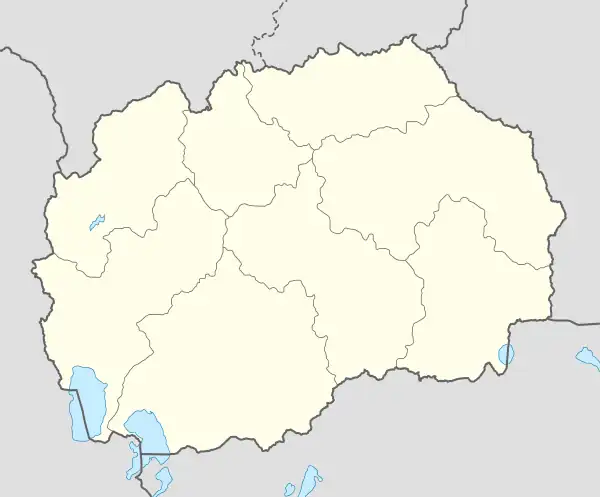 Grnčari Location within North Macedonia | |
| Coordinates: 41°01′06″N 21°03′12″E / 41.01833°N 21.05333°E | |
| Country | |
| Region | |
| Municipality | |
| Population (2021) | |
| • Total | 311 |
| Time zone | UTC+1 (CET) |
| • Summer (DST) | UTC+2 (CEST) |
| Area code | +389 |
| Car plates | RE |
Grnčari (Macedonian: Грнчари, Albanian: Gërçar, Turkish: Grınçar) is a village in the Resen Municipality of North Macedonia. Located just under 9 kilometres (5.6 mi) from the municipal centre of Resen,[1] the village has 417 residents.[2]
Demographics
The village of Grnčari is inhabited by an Sunni Muslim Albanian speaking majority and Orthodox Macedonian minority.[3] A few Turkish speaking families are also present in Grnčari.[3] Sunni Albanians in Grnčari traditionally highlighted their religious identity over a linguistic one having closer economic and social relations with Turks and Macedonian Muslims in the region and being distant from Orthodox Macedonians.[3] Over time these differences have disappeared through intermarriage, closer communal and cultural relations with Bektashi and other Sunni Prespa Albanian communities in the region.[3]
In statistics gathered by Vasil Kanchov in 1900, the village of Grnčari was inhabited by 165 Bulgarian Christians and 300 Muslim Albanians.[4] In 1905 in statistics gathered by Dimitar Mishev Brancoff, Grnčari was inhabited by 120 Bulgarian Exarchists and 360 Muslim Albanians.[5] After World War Two, some Albanian settlements in Yugoslavia declared themselves as Turks due to the word being a generic term for Muslims or pressure by Yugoslav authorities to do so.[6][7] In the 2002 census, Albanians form a large ethnic majority in the village.[8]
| Ethnic group |
census 1961 | census 1971 | census 1981 | census 1991 | census 1994 | census 2002 | census 2021 | |||||||
|---|---|---|---|---|---|---|---|---|---|---|---|---|---|---|
| Number | % | Number | % | Number | % | Number | % | Number | % | Number | % | Number | % | |
| Macedonians | 170 | 17.7 | 157 | 15.0 | 164 | 13.6 | 102 | 12.6 | 92 | 19.3 | 79 | 18.9 | 54 | 17.4 |
| Albanians | 194 | 20.2 | 838 | 79.9 | 963 | 79.9 | 354 | 43.8 | 362 | 76.1 | 326 | 78.2 | 230 | 74.0 |
| Turks | 597 | 62.1 | 49 | 4.8 | 61 | 5.1 | 43 | 5.3 | 22 | 4.6 | 11 | 2.6 | 4 | 1.3 |
| others | 1 | 0.1 | 5 | 0.5 | 17 | 1.4 | 309 | 38.2 | 0 | 0.0 | 1 | 0.2 | 1 | 0.3 |
| Persons for whom data are taken from administrative sources | 22 | 7.1 | ||||||||||||
| Total | 962 | 1,049 | 1,205 | 808 | 476 | 417 | 311 | |||||||
Sports
Local football club KF Lirija Gërçar play in the Macedonian Third League (Southwest Division).
Gallery
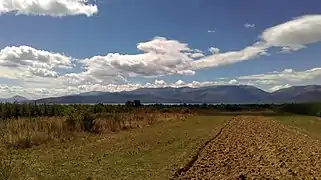 Fields of Grnčari, with Lake Prespa and Galičica mountains in the background
Fields of Grnčari, with Lake Prespa and Galičica mountains in the background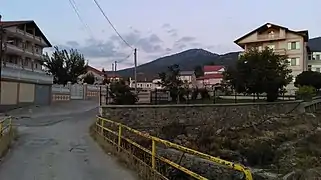 Architecture of Grnčari
Architecture of Grnčari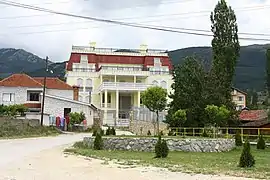
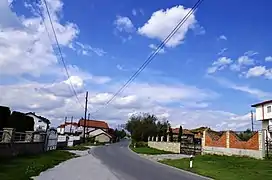 View from Grnčari of the road toward Podmočani. On the right side near the big mulberry tree is the house of the Selimi-Banushi family (one of the few traditional houses left in the village)
View from Grnčari of the road toward Podmočani. On the right side near the big mulberry tree is the house of the Selimi-Banushi family (one of the few traditional houses left in the village)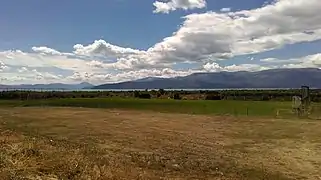 Local football ground of Grnčari football team
Local football ground of Grnčari football team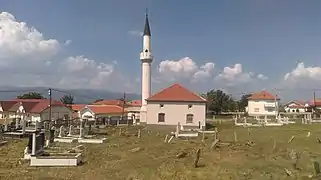 Mosque and Muslim cemetery of Grnčari
Mosque and Muslim cemetery of Grnčari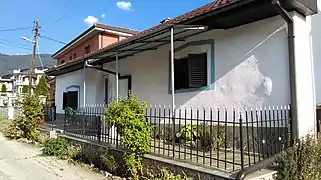 Tekke of Sali Baba, Grnčari
Tekke of Sali Baba, Grnčari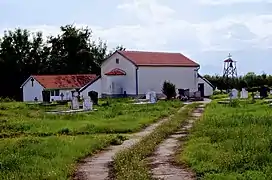 Church of St. Athanasius and Orthodox cemetery, Grnčari
Church of St. Athanasius and Orthodox cemetery, Grnčari_42.jpg.webp) St. Elijah Monastery, Grnčari (built 18th century)
St. Elijah Monastery, Grnčari (built 18th century)_26.jpg.webp) Iconostasis of St. Elijah Monastery, Grnčari
Iconostasis of St. Elijah Monastery, Grnčari_15.jpg.webp) Forest of Grnčari on the slopes of the Baba mountain range
Forest of Grnčari on the slopes of the Baba mountain range
References
- ↑ "Grnčari". Retrieved 11 Sep 2013.
- ↑ "Municipality of Resen". Archived from the original on 2018-08-31. Retrieved 2013-09-12.
- 1 2 3 4 Sugarman, Jane (1997). Engendering song: Singing and subjectivity at Prespa Albanian weddings. University of Chicago Press. pp. 9–11. ISBN 9780226779720.
- ↑ Vasil Kanchov (1900). Macedonia: Ethnography and Statistics. Sofia. p. 241.
- ↑ D.M.Brancoff (1905). La Macédoine et sa Population Chrétienne. Paris. pp. 170-171.
- ↑ Brunnbauer, Ulf (2004). "Fertility, families and ethnic conflict: Macedonians and Albanians in the Republic of Macedonia, 1944–2002." Nationalities papers. 32. (3): 568. "The decrease of the proportion of Albanians between 1948 and 1953 was due to the fact that in 1953 many Albanian-speaking Muslims identified themselves as "Turks" in order to be able to emigrate to Turkey. Hence the share of the "Turkish" population grew from 8.3% in 1948 to 15.6% in 1953. During the 1950s, around 130,000 "Turks" emigrated from Yugoslav Macedonia to Turkey, as a result of an emigration agreement between Yugoslavia and Turkey." ; p. 583. "Once communist power was established, the Albanians, and the Muslim communities in general, felt increasingly alienated from the state, for example, because of its anti-religious agenda, its ethnic Macedonian outlook, the strong Serbian influence, and its radical attempts to change the role of women…. The local elites of the Albanians, and especially the Muslim clergy, had associated inclusion in the social mainstream with the dangers of cultural pollution and assimilation. This alienation from socialist transformation was among the reasons why thousands of Albanians emigrated as "Turks" to Turkey in the 1950s. Hence, the effects of discrimination by state authorities were multiplied by those of self-isolation."
- ↑ Friedman, Victor (2003). "Language in Macedonia as an identity construction site." In Joseph, Brian (ed). When Languages Collide: Perspectives on Language Conflict, Language Competition, and Language Coexistence]. Ohio State university press. p. 272. When the 1948 census was conducted, relations between Yugoslavia and Albania were good while those between Yugoslavia and Turkey were not. By 1953, Tito had broken with Stalin and in the wake of that split Yugoslavia had broken with Albania while improving relations with Turkey. The subsequent decades saw both emigration to Turkey (sometimes for economic reasons, but see also Akan 2000, 81—1 19) by those declaring Turkish nationality (sometimes declared on the basis of Muslim religion rather than Turkish mother tongue) as well as rising Albanian nationalism and pressure on Muslims in Kosovo and Western Macedonia to declare Albanian nationality (Tanasković 1992 143—44; Akan 2000, 179—221). The 1981 census was the last uncontested census conducted in former Yugoslavia.
- ↑ Censuses of population 1948 - 2002 Archived 2013-10-14 at the Wayback Machine